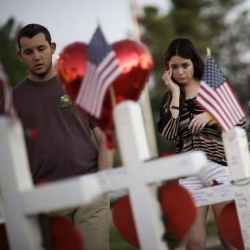
MGM Resorts characterized their lawsuit as preemptive, to assure the victims do no seek damages against Mandalay Bay’s parent company.
MGM Resorts International filed lawsuits against approximately 1,000 victims of the Mandalay Bay shooting. MGM Resorts, the owner of Mandalay Bay, filed suit against the victims to pre-empt liability claims, according to the Las Vegas Review-Journal.
The filing could hurt MGM Resorts in the public relations arena, but makes legal sense, because it applies pressure to possible plaintiffs that otherwise might not exist.
The suit refers to the October 1, 2017 shooting at the Route 91 Harvest concert outside the Mandalay Bay Hotel & Casino. Stephen Paddock, a years-long high roller in Las Vegas Strip casinos, fired with high-powered rifles into a crowd of 22,000 concert goers, killing 58 and injuring over 500 more.
Stephen Paddock was perched on the 32nd floor balcony at the Mandalay Bay. Paddock had rented the 32nd floor suite for several days before the shooting, as he set up his eventual assault.
MGM Resorts Cites 2002 Safety Act
In its lawsuits, which were filed on Thursday and Friday last week, MGM Resorts argued that it cannot be sued by victims of the shooting. In its filing, MGM Resorts’ lawyers stated that claims against the casino “must be dismissed”, due to a 2002 federal act.
According to the 2002 federal act, passed by the US Congress in the wake of the 9/11 attacks, venues that employ anti-terrorism services cannot be sued for damages due to terrorist attacks on their premises. MGM Resorts claims that Mandalay Bay employed anti-terrorism services.
In the suit, MGM Resorts claims that a security firm Mandalay Bay employed had been certified by the Department of Homeland Security for “protecting against and responding to acts of mass injury and destruction.” That is the justification for the MGM Resorts lawsuits against the shooting’s victims.
Victims’ Lawyer Cites Negligence
Robert Eglet, a lawyer for a group of the victims, said Mandalay Bay is liable for the damage caused to the victims, because it was negligent. He said of the lawsuit that Mandalay Bay is “hiding behind the federal act in an attempt to prevent [victims] from obtaining justice against those responsible.”
The Las Vegas-area lawyer pointed to the lax security which allowed Stephen Paddock to carry dozens of weapons into his hotel suite over a 4 to 5-day period. In many cases, Paddock had Mandalay Bay staff carry those weapons into his hotel room. Over a four-day period, Stephen Paddock used a “Do Not Disturb” sign to keep out staff.
Robert Eglet says four days is too long to stop monitoring a customer, and out of the norm for Las Vegas casinos. Eglet said, “Mandalay Bay’s negligence permitted the Route 91 gunman the space he needed to set up his weapons and prepare his attack on festivalgoers below.”
“Having failed to keep their property safe, they are trying to shift responsibility to the security company at the concert. But for Mandalay Bay’s lack of security, there would not have been any Route 91 victims.”
MGM Resorts Spokeswoman on Litigation
Debra DeShong, a spokesman for MGM Resorts International, said litigation was unjustified and would be unfruitful. DeShong told ‘Inside Edition’, “The Federal Court is an appropriate venue for these cases and provides those affected with the opportunity for a timely resolution. Years of drawn out litigation and hearings are not in the best interest of victims, the community, and those still healing.”
Eglet Alleges Abuse of 2002 Safety Act
Robert Eglet said that Mandalay Bay was abusing a 9/11 era law which was not passed to shield casinos from its lack of responsibility. Eglet said, “The Safety Act was a response by Congress to the terrorist attack of Sept. 11, 2001, to encourage companies to get into the business of developing anti-terrorism technology. It was not designed to limit the liability of Mandalay Bay that, despite prior incidents, affirmatively assisted a gunman to shoot out of its window and people below.”
The case could set a precedent for future terrorist incidents or shooting cases which happen at a casino-resort. This is the first time such a case has been filed using the 2002 Safety Act, so the law’s real meaning is being tested. It is uncertain whether the defendents in the lawsuit will continue to mount a legal challenge against MGM Resorts or not. They presumably would not have the deep pockets to deal with a years-long lawsuit.
In most cases where victims filed a case, they are the plaintiffs and they have a deal with the lawyer based on an eventual win in the civil litigation. Having to defend in a second case might change the calculations, which is the reason MGM Resorts chose the preemptive legal action.
